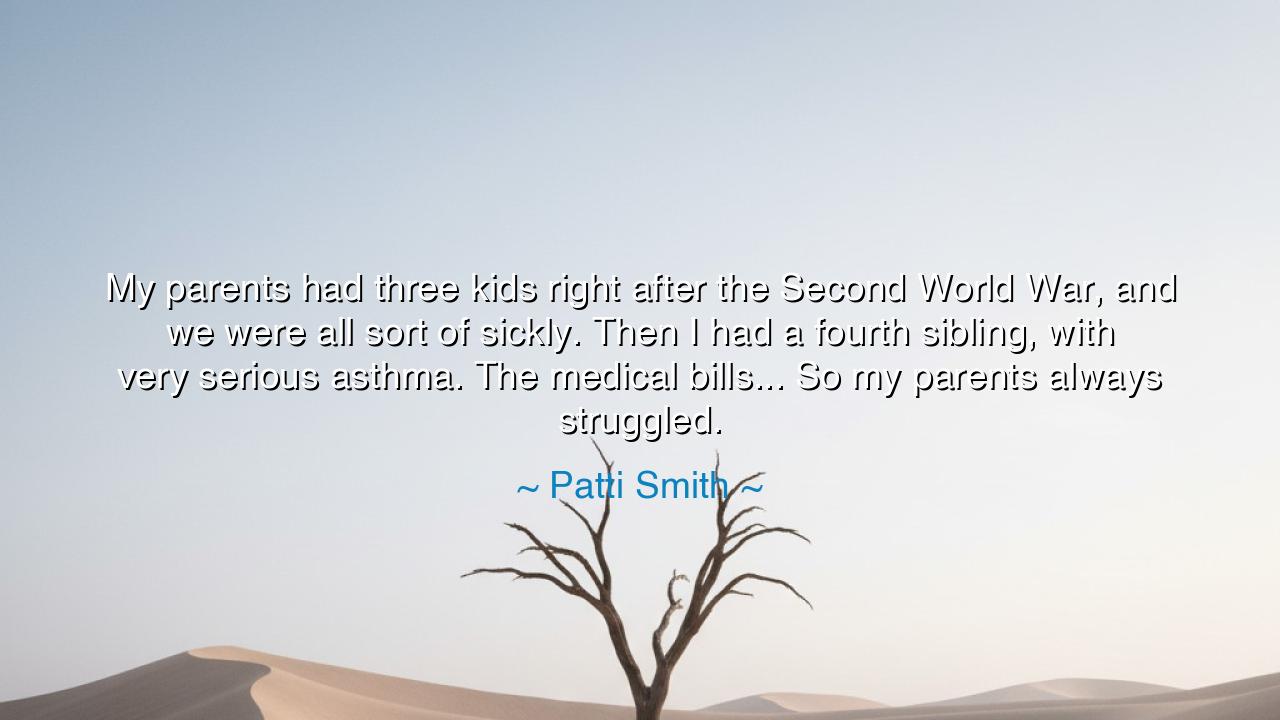
My parents had three kids right after the Second World War, and
My parents had three kids right after the Second World War, and we were all sort of sickly. Then I had a fourth sibling, with very serious asthma. The medical bills... So my parents always struggled.






In the words of Patti Smith, poet of truth and prophet of resilience, there breathes the ache of an entire generation: “My parents had three kids right after the Second World War, and we were all sort of sickly. Then I had a fourth sibling, with very serious asthma. The medical bills... So my parents always struggled.” These are not words of complaint, but of remembrance — a hymn for the quiet endurance of those who built their lives upon the ruins of war. It is a story of struggle, yes, but also of love, of a family bound not by wealth but by will, and of the silent nobility of those who bore hardship without bitterness.
To understand the weight of her words, we must see the world into which Patti Smith was born. The Second World War had ended, leaving behind both victory and vacancy. Across the world, cities were scarred, nations weary, and men and women returned home carrying wounds the eye could not see. Yet amid the ashes, there was also hope — the will to rebuild, to love, to create life anew. Families blossomed quickly, as though in defiance of despair. But the shadow of hardship did not vanish; it only changed its form. Illness, poverty, and the rising cost of survival followed many who thought peace would bring ease. The Smiths were among them — an ordinary family living in extraordinary times, struggling not against enemies, but against circumstance.
When Patti speaks of her parents’ struggles, she speaks of a generation that bore its burdens with quiet grace. Her father, a factory worker, labored tirelessly; her mother, a waitress, gave her strength in the form of small sacrifices — a skipped meal, a mended coat, a whispered prayer. The medical bills, those relentless symbols of survival’s cost, piled upon them like stones. Yet through it all, they did not surrender. They raised their children in the light of endurance, teaching them that hardship is not a curse, but a crucible. From such soil would grow Patti Smith’s art — art forged in hunger, lit by faith, and tempered by empathy.
There is a rhythm in such lives, one known to all who have been shaped by struggle. It is the rhythm of the worker rising before dawn, of the mother soothing a sick child by candlelight, of the family that finds joy not in luxury, but in one another. History is full of such people — nameless, often forgotten, yet they are the pillars upon which every civilization stands. Consider the families of postwar Japan, or the miners of Wales, or the sharecroppers of America’s South — all bound by labor, loss, and love. Their stories echo through time, not in grand speeches, but in the simple truth that suffering borne with dignity becomes strength.
From these humble beginnings arose Patti Smith, the “Godmother of Punk,” whose songs and poems carried the raw beauty of truth. She learned early that to create is to survive, and that every word she wrote was an offering to those who came before her — those who worked, struggled, and dreamed so that she might one day speak. Her parents’ hardship became her inheritance, not of money, but of meaning. Through them she learned compassion for the broken, reverence for the weary, and faith in the human spirit’s unbreakable flame.
Her story is not unique — and that is its power. It belongs to every family that has fought through illness, debt, or despair, yet refused to let love die. It is the story of ordinary heroes, those who build without acclaim, who endure without applause. And it reminds us that greatness often rises not from comfort, but from adversity. For the soul that has known hunger learns to cherish abundance; the heart that has known loss learns to cradle joy more gently.
So, my children, let this be your lesson: struggle is not the end of hope, but its beginning. Do not curse the hardships of your life, for they are the chisels that carve your spirit into form. Remember the sacrifices of those who came before — your parents, your elders, the nameless toilers who made your ease possible. When the world grows heavy, think of them, and let their strength become your own.
For in the quiet endurance of Patti Smith’s parents, and in the thousands like them, lies the secret of all endurance: that love, when tested, does not fade — it deepens. And though their hands were weary and their pockets empty, their legacy endures in the songs of their daughter, and in every heart that still dares to believe that beauty can rise from struggle, and that the human spirit — though poor, though battered — is never truly broken.






AAdministratorAdministrator
Welcome, honored guests. Please leave a comment, we will respond soon